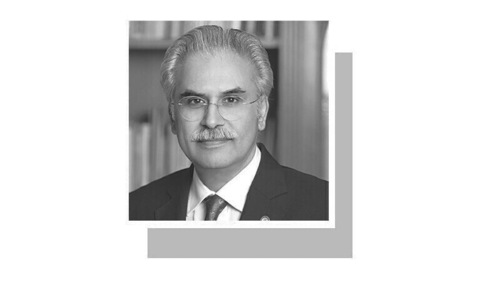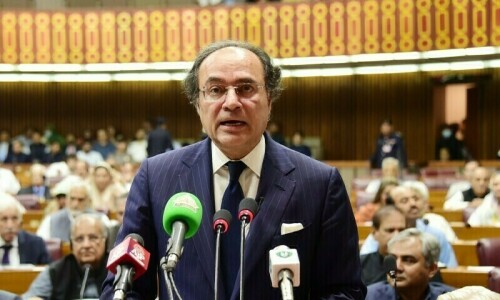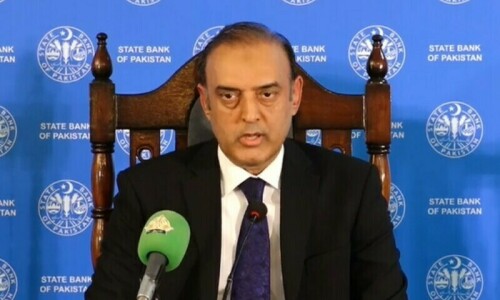WE appear to be witnessing a period of unusual activity all around, with major powers engaged in diplomatic initiatives to reinforce old alliances, while crafting new ones. Islamabad, however, seems strangely unconcerned.
The most dramatic event in this context was President Obama's visit to India which confirmed a mutual resolve to invest in a truly strategic relationship. Then there was the Nato summit in Lisbon where the alliance declared its intention to remain engaged in Afghan operations until 2014.More importantly, Russian President Medvedev not only attended the summit he also offered cooperation in the alliance's Afghan operations, including greater transit facilities for Nato equipment going to Afghanistan.
Earlier, the US midterm elections handed over control of the House to the Republicans, which can only mean greater pressure for Pakistan. The renewed skirmishes in the Korean Peninsula are also likely to add to the existing tension between China and the US. The icing on the cake came with WikiLeaks' disclosures portraying Pakistan in an unfavourable light, while highlighting the 'trust deficit' between Washington and Islamabad.
These events demand urgent debate at home and consultation with friends abroad.
Obama's visit to India confirmed the earlier impression that India-US relations should not be seen merely in terms of the dollar value of their agreements, nor in the context of the so-called 'entities list'. Nor should they be perceived as confined to President Obama's endorsement of India's claim to a permanent seat in the UN Security Council. Most importantly, the visit cemented their mutual desire to so dovetail their cooperation as to mutually reinforce their common objectives.
But while Obama was reassuring his hosts that India had “already emerged” as a major power, neither country could have been unaware of the elephant (or was it the dragon?) hovering over the talks. It was, of course China, though there is a touch of irony in this, for Obama had begun his presidency determined to inject personal warmth into US-China relations.
Not too long ago, their cooperation led to murmurs of disquiet that they were establishing a G2 condominium to dominate the global economic agenda. The Beijing statement issued after Obama's visit last year acknowledging China's role in ensuring stability in the region was especially galling to India.
All that now appears in the distant past. What explains this? For one, the reaction to Obama's initiative did not go down well with some of America's traditional friends in the Pacific. The US too began to suspect that China was becoming increasingly oblivious to its interests.
The Chinese, on the other hand, accuse the American defence and intelligence agencies of having played a role in reversing Obama's policy, while encouraging China's neighbours to adopt a more belligerent attitude towards Beijing. Whatever the merits of their recriminations, there has been a perceptible rise in friction between China and its neighbours over several issues including trade, economy, security and territorial disputes.
The Pentagon's report that China's military strategists were increasing their investment in nuclear weapons and other sophisticated weapons systems have added to concern in the neighbourhood. This has brought Southeast Asian nations closer to the US, encouraging them to spend huge sums of money on building their military forces.
While Chinese officials have refrained from making inflammatory comments, their scholars have not shied away from accusing the US of trying to “nurture a coalition against China”, and “engaging in an increasingly tight encirclement and challenging China's core interests”.
US officials respond that they are reacting to what they see as a surge of China's triumphalism, though others admit that domestic political factors have contributed to the administration's tougher posture, particularly with US legislators demonising China as a threat to American jobs.
David Shambaugh, a well-known China expert, reflected this sentiment when he warned that since China was proving to be “an increasingly narrow minded, self-interested, truculent, hyper-nationalist and powerful country”, the administration should signal to Beijing that “the US has other closer, deeper friends in the region”.
There has also been a growing tendency on the part of the US, Australia, Japan, South Korea and India to encourage the perception that China's economic power has made its diplomacy more assertive.
This does not mean that India will henceforth toe the US line on all issues. It is too big and too proud to ignore its own interests. Nevertheless, there is a growing similarity of views between the two and a remarkable convergence of interests that is going to have a profound influence on the region.
If this is aimed at 'containing' China, should the need arise at some point, then such a policy can only usher in discord in the region. Moreover, if the US thinks that it can build 'strategic' ties with India while ignoring Pakistan's core interests, it is mistaken.
But what is even more fascinating is that after years of friction between Russia and the US, Moscow has begun responding positively to Obama's desire to 'reset' relations. President Medvedev's presence at the Lisbon summit was not only a departure from past practice, it indicated a shift in the way Moscow wishes to conduct relations with its former adversary.
Admittedly, Obama has gone out of his way to accommodate the Russians, especially on the issue of missile placement in East Europe that was vociferously opposed by them. The two countries have also signed the new START treaty and an agreement on civilian nuclear cooperation, while advancing the process of Russia's accession to the World Trade Organisation.
The result is evident from Russia's support for much firmer sanctions against Iran, as well as willingness to work with the US on Afghanistan. n
These are all important developments that are likely to pose major challenges for Pakistan which, as evident from the WikiLeaks disclosures, has lost the trust of some of its traditional allies. This calls for building a national consensus at home on critical aspects of our foreign policy and the pursuit of our core interests with skill, resolve and imagination.
The writer is a former ambassador.










































Dear visitor, the comments section is undergoing an overhaul and will return soon.